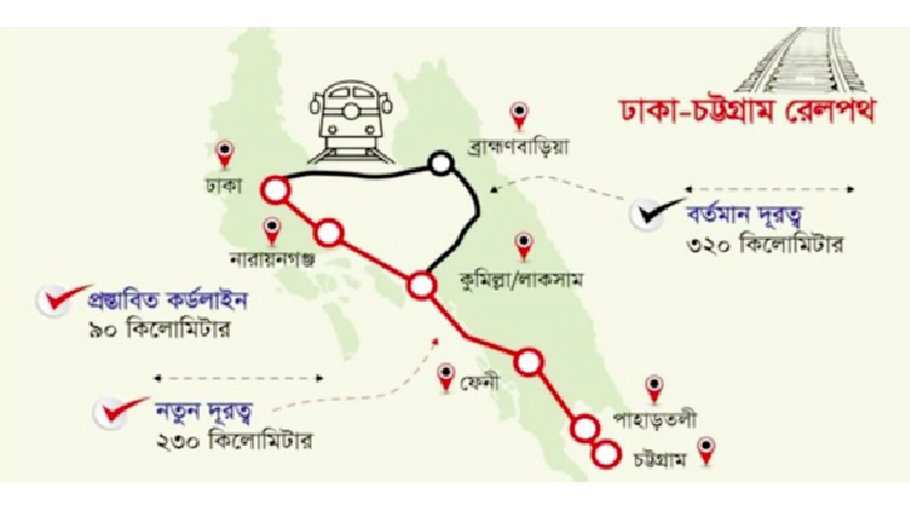Stalled Dhaka-Ctg chord line project: A missed opportunity

The project to develop an alternative railway route that would cut 90km distance from the existing Dhaka-Chattogram line has come to a standstill, raising concerns that Bangladesh Railway maght miss a great opportunity.
The proposed 230-kilometer rail route (chord line) was designed to reduce time of travel between the capital city of Dhaka and commercial hub Chittagong to just three hours from existing five hours.
Bangladesh Railway (BR) launched the project in 2010 after a feasibility study, but it faced a series of hurdles.
Despite the potential to transform the rail communication between the capital Dhaka and Chattogram, the alternative rail route project has been halted for reasons unknown.
Project director Mahbubur Rahman said that the Ministry of Railways issued an order on March 12 to suspend all the activities related to the chord line.
Sources concerned say that the project was to be completed by December 31, 2024. It is likely to be extended by an additional four months. This delay comes despite approval from the Cabinet Committee on Government Purchase (CCGP) in January 2023, which greenlit a detailed feasibility study and design development for the new route.
Following the approval, a consortium comprising Japan’s Oriental Consultant Global, France’s EGIS, and Malaysia’s HSS was formed to explore three possible rail routes for travel between Dhaka and Chattogram.
The first option, a route via Dhaka-Narayanganj-Sonargaon-Meghna-Muradnagar-Debidwar-Burichang-Cumilla Sadar route. The length of this route is 82.5 kilometers. The new rail route will connect with the existing Dhaka-Chattogram railway 3.5 kilometers north of Cumilla Railway Station. The initial estimated construction cost for this route is Tk 61,738 crore.
The second option suggests the Dhaka-Narayanganj Sadar-Meghna-Muradnagar-Chandina-Barura-Cumilla Sadar South-Laksam route. This route is 94.8 km long, with an estimated construction cost of Tk 69,194 crore.
The third option outlines the Dhaka-Kadamtali-Narayanganj-Sonargaon-Gazaria-Daudkandi-Cumilla Sadar South-Laksam route, with a length of 91 kilometers and an estimated cost of Tk 65,843 crore.
The chord line’s potential to drastically cut travel time and operational costs while boosting revenue for Bangladesh Railway underscores the project's importance.
The consortium’s strategic paper indicates that reducing the route length and train travel time would provide seven benefits for Bangladesh Railway.
Firstly, the non-stop train journey from Dhaka to Chittagong could be shortened from about 5 hours to just 2.30 hours.
Secondly, the proposed Chord Line would reduce operational cost for Bangladesh Railway and more than double its revenue. With the rolling stock, it would be possible to operate a greater number of trains daily, tripling revenue from this route.
Thirdly, Dhaka-Cumilla travel time would be reduced to a maximum one hour. This would allow the introduction of regular commuter services between Cumilla and Dhaka, creating multiple suburban areas along the route and easing the pressure on the capital.
Fourthly, extra pressure on the Dhaka-Tongi section would be reduced, allowing trains to avoid long wait due to signaling. Trains from the western region could bypass the Dhaka-Tongi route and enter Dhaka from the south.
Fifthly, the new route would increase the strategic importance of the inter-country corridor. It would become an important part of the Trans-Asian Railway (TAR), the Bangladesh-China-India-Myanmar (BCIM) economic corridor, and the Bay of Bengal Initiative for Multi-Sectoral Technical and Economic Cooperation (BIMSTEC) route.
Sixthly, the feasibility study and detailed design would take electric traction into consideration, opening new opportunities for the Bangladesh Railway.
Seventhly, due to congestion on the existing railway, it is not possible to increase the number of freight trains. However, with the construction of a double-track railway, freight transportation would increase, potentially making Bangladesh Railway profitable through this route alone.
However, despite these advantages, the project has faced inexplicable delays.
Former Secretary of the Ministry of Railways Humayun Kabir suggested that the project was not considered a top priority, contributing to its suspension.
Meanwhile, a senior official from Bangladesh Railway, on condition of anonymity said there are hidden motives behind the project’s stagnation. According to him, vested interests aim to keep the railway sector unprofitable to benefit private transport operators.
Ashish Kumar Dey, General Secretary of the National Committee to Protect Shipping, Roads, and Railways, echoed these concerns, pointing to a deliberate effort by influential groups to undermine the development of Bangladesh Railway.
“A vested interest group has long been working to cripple Bangladesh Railway,” Dey stated, criticizing the ongoing obstruction of the chord line project.
Sardar Sahadat Ali, Director General of Bangladesh Railway, confirmed that the Ministry of Railways issued a directive to halt the project without providing any explanation. This sudden move has left stakeholders disappointed as through implementation of the project Bangladesh Railway can be turn a profitable entity in the country’s transportation sector.



